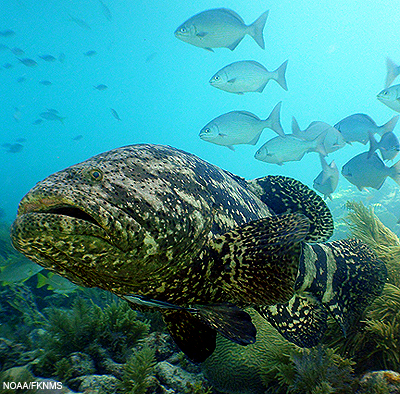New Year's Resolution 2012: Let's Gain Weight in the Ocean
Thanks for following along with my “Overfishing 101” series. As I mentioned in my last post, I'm kicking off 2012 with a new series, “The Bottom Line.” I'll be covering more ground and broader fisheries-related topics and hope you'll enjoy my new endeavor.

One of the most popular New Year's resolutions for Americans is to lose weight. Around this time of year, gyms fill up, the health food sections of supermarkets become crowded, and people whose daily exercise consisted of picking up their mail start jogging.
But for the fish in America's oceans, we need to resolve to help them gain weight. Bigger, older animals will create abundant offspring, which will lead to better fishing, increased seafood, more jobs, and healthier and more resilient ocean ecosystems. Here are some specific things we can do to keep this important resolution:
- Effectively implement America's fishing law. We should leverage the tremendous progress made in the past five years by effectively enforcing to the Magnuson-Stevens Fishery Conservation and Management Act, our nation's ocean fishing law. Last year, scientists, managers, fishermen, and other stakeholders developed plans to prevent overfishing through enforceable catch limits, and 2012 marks the first year in which these measures take effect in many regions. The challenges in carrying out the law will vary across the country, but these resolutions will help the fish in our oceans put on millions of pounds:
-New England—Expand upon the first-year conservation success of sectors (cooperative fishing groups) in order to restore cod and other bottom-dwelling species that play a vital role in the region's economy and culture.
- Mid-Atlantic—Continue to follow the science and ensure that fishermen benefit from the accomplishments of past efforts to restore important stocks, such as summer flounder, while keeping these species at healthy levels.
- South Atlantic—Remain committed to restoring dwindling fish populations, such as the iconic red snapper, protect ones that are healthy, and focus on improving recreational fishing data.
- Gulf of Mexico—Invest in science and in the management of the region's fisheries, which are essential to recovery from oil spills, hurricanes, and past overfishing.
- Caribbean—Support science-based efforts to save fish and coral reefs, which are so important for local economies and tourism.
The benefits of fish gaining weight in the ocean will be far-reaching and will extend to several other common New Year's resolutions: making more money, getting a job, and finally, being happy.- Lee Crockett, director of federal fisheries policy
- Make fisheries funding a priority in the appropriations process. This year, Congress again will be asked to invest in federal fishery data collection and analysis programs that are essential for fishery managers and for fishermen to make business decisions and plan for investments in their companies. Last year, Congress bucked the budget-cutting trend and increased funding for these programs. Congress should keep showing its support for America's fish and fishermen by continuing these investments in 2012 and beyond.
The benefits of fish gaining weight in the ocean will be far-reaching and will extend to several other common New Year's resolutions: making more money by leaving enough fish in the water for marine-dependent businesses to generate greater income in 2013 and beyond; getting a job as new employment opportunities are created in fishing and related industries; and finally, being happy as we enjoy better fishing opportunities and ample, healthy seafood.
Sustainability is an ongoing process in a changing world. Ensuring healthy oceans isn't going to be easy, but if we keep true to this resolution, I'm confident we will see real change on the water and tangible benefits for millions of Americans.






